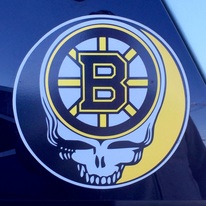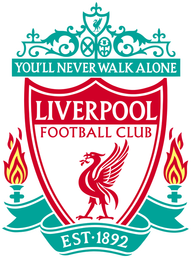NOTES FROM AN EMPTY TABLE
|
ESSAYS, POEMS, AND STORIES (BUT MOSTLY ESSAYS)
ON CULTURE, CALAMITY, AND CREATING BY TOM GUZZIO |
|
ESSAYS, POEMS, AND STORIES (BUT MOSTLY ESSAYS)
ON CULTURE, CALAMITY, AND CREATING BY TOM GUZZIO |
 The Grateful Dead's "Steal Your Face" and Boston Bruins logo mash-up. The Grateful Dead's "Steal Your Face" and Boston Bruins logo mash-up.
Help me out. Is there a space where sports and music meet that doesn’t wind up looking and sounding like a Looney Tune? As I moved from music to sports while prepping for the upcoming issue, I tried to find a convergence of the two topics that leaves both with some dignity, but it was just not happening. Maybe it’s because the seminal volume of sports-related music is called, Jock Jams. Maybe I needed to look a little deeper.
There are a lot of songs out there related to and / or inspired by sports, but they seem trite and trend towards novelty. I’m thinking of songs like “Basketball” by Kurtis Blow (who's a Hip-Hop legend), or “Centerfield” by John Fogerty (another legendary artist). On the other hand, songs unrelated to athletic competition often get co-opted by sports, and thereby have a second (or maybe even a first) life seemingly unrelated to their stated themes or lyrical intent. Take “Song 2” by Brit-Pop icons Blur. Released in 1997, and originally intended as a satire of American grunge music, it’s now become a stadium staple, it’s two-syllable hook used to pump up crowds the world over, joining songs like The White Stripe’s “Seven Nation Army” and Guns N’ Roses’ “Welcome to the Jungle” as unlikely declarations of fandom.  The official Liverpool FC crest. The official Liverpool FC crest.
Eventually, I stumbled upon songs that, for one reason or another, have become so associated with certain teams as to transcend their original context and purpose, like the Rodgers and Hammerstein's, “You’ll Never Walk Alone,” which found life beyond Carousel – the musical it was written for – as Jerry Lewis’s telethon showpiece and also as Liverpool F.C.’s anthem. Unlike “Song 2,” one can actually establish a connection between the song and the team that adopted it. In 1963 “You’ll Never Walk Alone” became a number one single for Gerry and the Pacemakers, who hailed from Liverpool. Legend has it that Gerry Marsden – the group’s leader and vocalist – gave a copy of the song to Liverpool manager Bill Shankly, who was so moved that he insisted the song be played before home games. In reality, the song’s presence at Anfield is the result of the club’s music director simply doing his job. It was practice at the time to countdown the hits of the day prior to the start of a game. When “YNWA” topped the charts, therefore becoming the last song the stadium DJ played just before game time, LFC fans simply sang along as a show of support to the Merseybeat group. The DJ played it, the fans liked it, and it stuck – so much so that members of the team joined Gerry and the Pacemakers on stage when they performed the song on The Ed Sullivan show. The song has since become part of the team’s iconography, adorning its official crest, and watching over those who pass through Anfield’s Shankly Gates.
“You’ll Never Walk Alone” illustrates how when a piece becomes so associated with a particular team, there’s a tendency to want to elevate that association to the point where the origin of said song’s connection to said team becomes mythic. This is true of other music – sports connections as well, like Neil Diamond’s “Sweet Caroline,” which is played during the 8th inning intermission at every Boston Red Sox home game, and the song that is said to be the third most popular song in American history (after “The Star Spangled Banner” and “Happy Birthday to You”): “Take Me Out to the Ball Game.” These songs have come to serve the same function as hymns, in a way, as they bring people worshipping at modern day “temples” together behind a common cause, and this is a powerful thing. Liverpool fans alive at the time will note how important “You’ll Never Walk Alone” became in the wake of the Hillsborough Disaster, which saw 96 LFC fans die in the crush of an overcrowded stadium in 1989. In the end, how the songs got here isn’t important. It’s the fact that they’re here that counts. At their best, music and sport serve similar functions. They celebrate excellence. They bring people together.
Comments
|
This website uses marketing and tracking technologies. Opting out of this will opt you out of all cookies, except for those needed to run the website. Note that some products may not work as well without tracking cookies. Opt Out of CookiesARCHIVES:
June 2024
|
